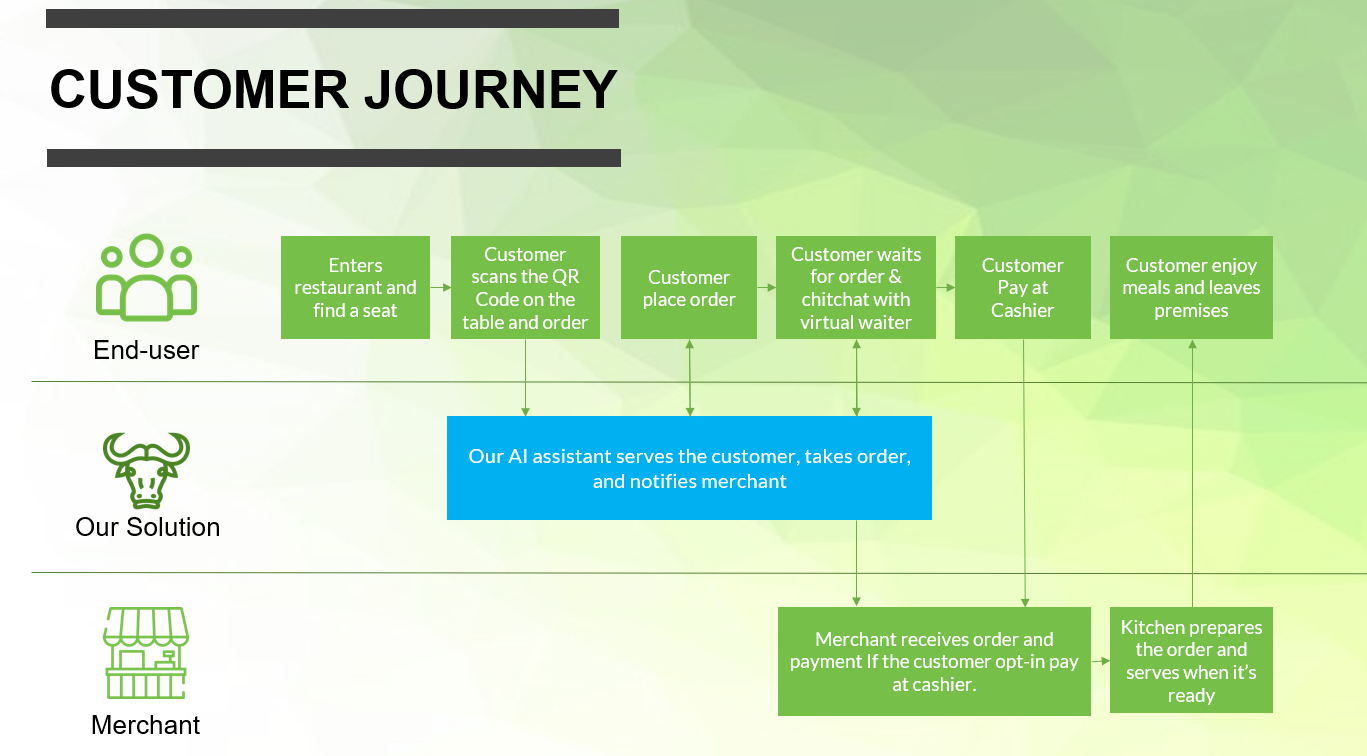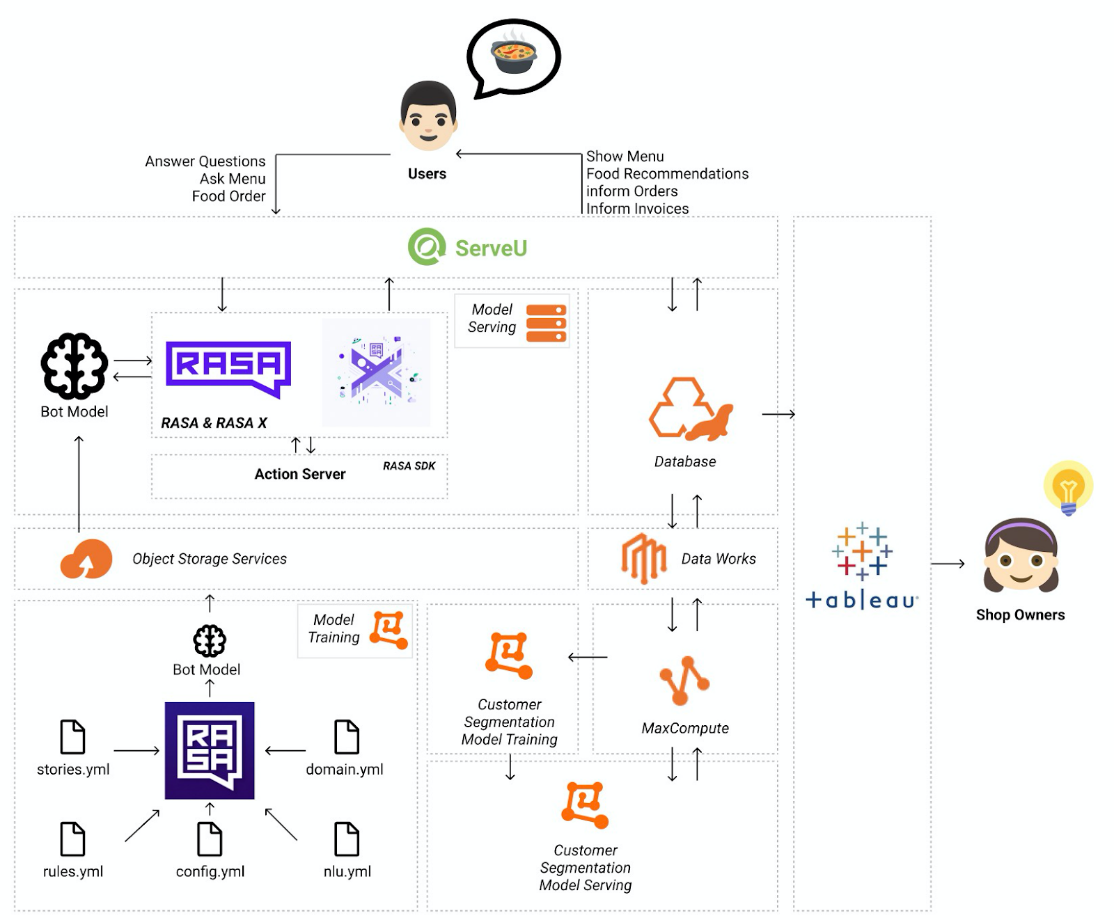
This project is from the team of BBLV, which was awarded first place in the Alibaba Global AI Innovation Challenge 2020.
The global pandemic has indeed left a substantial and devastating impact on the food and beverage (F&B) industry. For example, in the US, the latest data in December 2020 by the National Restaurant Association shows that nearly 110,000 restaurants had to close permanently, which is roughly 20% of the country's total number of restaurants.
A similar condition also happened in Indonesia. Businesses faced pressure not only from regulators but also from the shift in customers' behavior. Restaurants could only operate on a limited capacity and on a shorter permitted operational period. In addition, the uncertainty factor from constant regulatory changes, sometimes without prior notice, has led to further challenges for the F&B industry. Customers also prefer ordering takeaway and delivery instead of dining in, which limits the ability for shops to upsell products. Furthermore, the slowdown of the global economy has also led customers to become more cost-conscious when purchasing items.
Consequently, restaurants are experiencing significant drops in revenue. To sustain operations, restaurants must adapt by implementing cost-reduction measures. Layingoff or reducing staffs per shift seem to be one of the most sensible options. However, it comes with a service quality trade-off, such as longer service time and less attentive server. On the other hand, customers' expectations allow no compromise, even demand for higher service quality, with cleanliness and safety on top of mind.
We introduce ServeU to help restauranteurs to maintain the service quality by relieving the staffs' workload. ServeU provides a QR Code accessible online menu with a virtual waiter for restaurants that answer customers' questions and take orders. In addition, ServeU also offers personalization to customers and reduce the cost of human error during standard operation.
Our solution, ServeU, aims to increase the productivity of MSME (Micro, Small, and Medium Enterprise) in the Food and Beverage sector by taking advantage of technological developments, especially Artificial Intelligence. ServeU provides a QR code accessible online menu with virtual waiter for restaurants that answer customers' questions and take orders. After a customer enters the restaurant, find a seat, and scans the QR code on the table, they will meet our AI-powered virtual waiter who will serve them, takes the order, and notifies the merchant.

Figure 1 Customer Journey
In this project we utilize various range of Alibaba Cloud Platforms.
There were two machine learning models that we developed and served in this project. First is the Natural Language Understanding (NLU) model that uses the RASA framework. Second is the customer segmentation model using K-Means clustering algorithm.

We are use RASA for our main NLU model. RASA is an open-source framework to automate text and voice-based AI assistant. This framework leverage machine learning to understand user's intent and discussed object. It also uses the machine learning to manage how the assistant should response. RASA also very flexible to use as we can craft our own stories with supports in various integration, channel, and languages.
We use the Alibaba Cloud PAI DSW product to train NLU model. The model results then stored in the OSS as an intermediatory before deployed in ECS. After that, the model was deployed using docker through ECS and serve it through ServeU for our customers.
The customer segmentation model was utilized Alibaba Cloud Big Data services. The data from the Apps that stored in the RDS database was pulled to MaxCompute using Data Works. From that data, we use PAI Studio to do model training and create a model.
Then we create another pipeline using DataWorks to serve the model using PAI Studio too. After that the results was stored again in Database and we are using the third party BI Tools like Tableau to visualize the model results.
Our team consists of 4 members, all from technical backgrounds. Similar with a typical hackathon format, we split our roles into 3 types: Hustler, Hacker, and Hipster. Louis works as a Hacker who mainly focusing on the AI framework and implementation. Boy also has a role as a Hacker, but he's mainly focusing on the DevOps part. Vincent works not only as a Hustler who brings the concept together but also as a Hipster or the designer. While Bima has a role both as a Hacker and the Hipster, where as a Hacker, Bima mainly focusing on the MLOps part.
Virtual Real-Time Experiencing E-Learning: Children Education System Improvement
134 posts | 26 followers
FollowApache Flink Community - June 6, 2025
Neel_Shah - March 27, 2025
Alibaba Cloud Community - December 18, 2025
Alibaba Cloud MVP - July 9, 2021
Alipay Technology - November 26, 2019
Alibaba Cloud Project Hub - January 19, 2021
134 posts | 26 followers
Follow Platform For AI
Platform For AI
A platform that provides enterprise-level data modeling services based on machine learning algorithms to quickly meet your needs for data-driven operations.
Learn More Accelerated Global Networking Solution for Distance Learning
Accelerated Global Networking Solution for Distance Learning
Alibaba Cloud offers an accelerated global networking solution that makes distance learning just the same as in-class teaching.
Learn More Epidemic Prediction Solution
Epidemic Prediction Solution
This technology can be used to predict the spread of COVID-19 and help decision makers evaluate the impact of various prevention and control measures on the development of the epidemic.
Learn More AI Acceleration Solution
AI Acceleration Solution
Accelerate AI-driven business and AI model training and inference with Alibaba Cloud GPU technology
Learn MoreMore Posts by Alibaba Cloud Project Hub